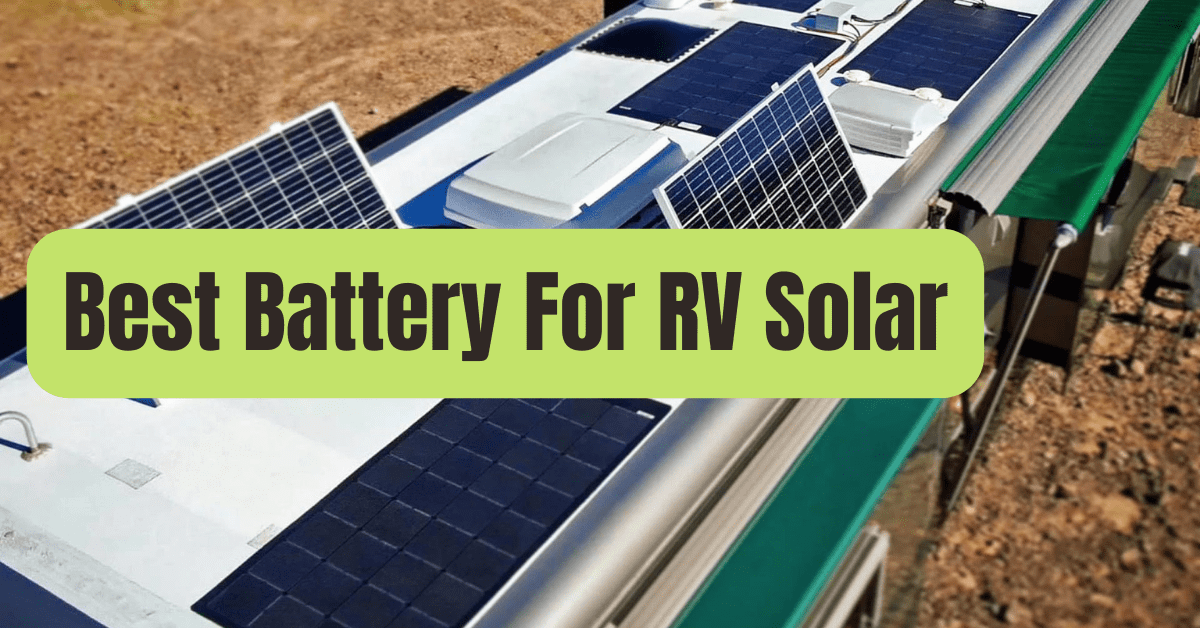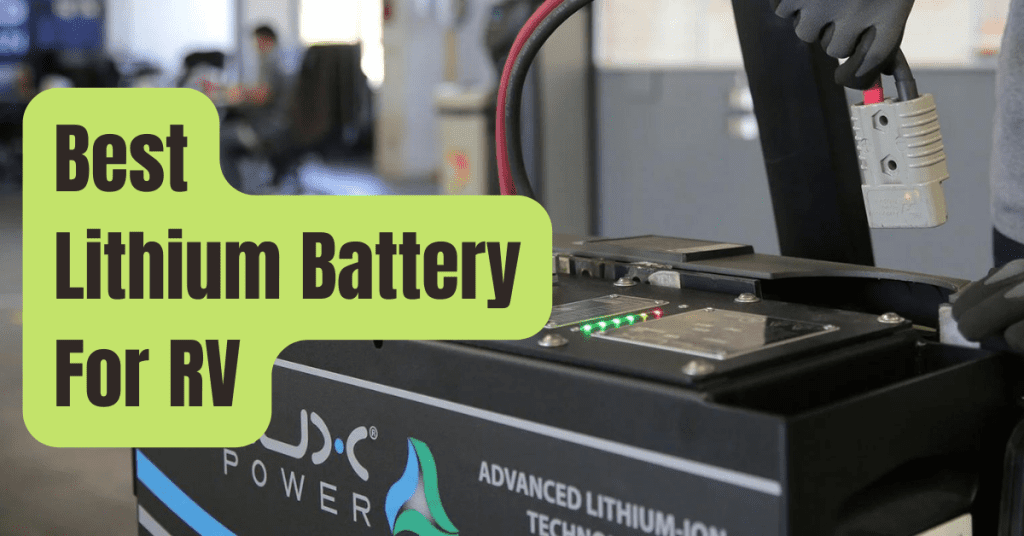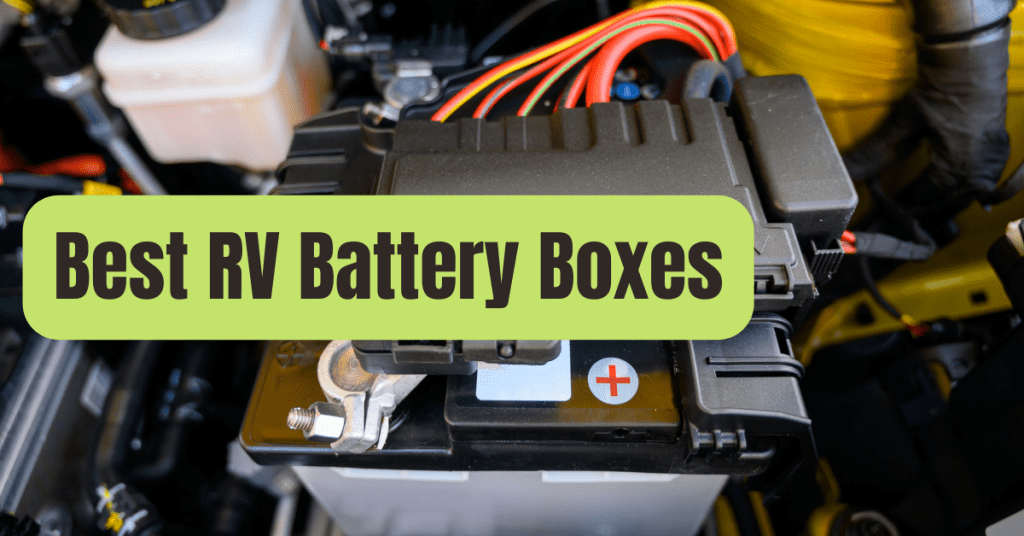Are you considering adding solar to your RV and are wondering which batteries are ideal for your set up? Alternately, have you thought about upgrading to lithium-ion RV batteries?
You should thoroughly investigate the top RV batteries before making a purchase since your battery bank is a crucial (and possibly costly) part of your RV solar system.
Dry camping in your RV doesn’t mean you have to give up the conveniences of home, but you will be depending on the batteries in your RV if you want to watch the game at night or if you need your morning coffee.
Solar panels may provide you with energy during the day, but you’ll need a way to store it for usage at night.
Purchasing high-quality RV batteries is a wise investment if you plan on utilizing energy at night.
Different RV Battery Types
You may think there are many different kinds of RV batteries based on a simple internet search.
Lithium and AGM are really the two main kinds.
- “Lithium” refers to both LiFePO4 (or lithium iron phosphate) and lithium ion. Due to this chemistry’s high level of safety and longevity, almost all lithium RV batteries are LiFePO4 batteries.
On the other hand, lithium ion batteries are often seen in electric vehicles and mobile phones since they are lighter and charge more quickly.
- “AGM” refers to lead acid, flooded, and gel batteries. The most widely used lead-acid RV batteries nowadays are AGM batteries.
While gel batteries have poor discharge/recharge rates and flooded batteries need regular maintenance, AGM batteries are somewhat more costly than the other two.
AGM is the best option if you decide to use lead-acid batteries.
Pro tip: Because terms like “12 volt,” “deep cycle,” and “marine” are used for both lithium and lead-acid batteries, they do not assist you distinguish which kind of battery you are looking at.
We may earn a small reward on purchases made via our affiliate links at no additional cost to you.
Things to Think About RV Batteries: Lead Acid vs. Lithium
Cost:
The price is the primary difference between lead-acid and lithium RV batteries.
Most RVers use lead-acid batteries due to their lower initial cost, but keep reading to see how lithium RV batteries may ultimately save you time and money.
Usable Volume:
The useable capacity of lithium batteries is a key factor in their superior performance over lead-acid batteries.
Batteries made of lead-acid cannot be discharged below 50% without suffering long-term harm.
A lead-acid battery will stop functioning if it is discharged even twice or three times below 50%.
The useable capacity for the lead-acid batteries on the list is in parentheses because of this restriction.
Lithium batteries may be completely depleted with no long-term consequences.
Thus, a 100Ah lithium battery has an useful capacity that is twice as large as a 100Ah lead-acid battery.
Weight:
Lead-acid batteries not only need twice as many, but they also weigh two to three times as much as lithium batteries.
When RVing, every ounce counts, thus being able to reduce weight was a key factor in our decision to use lithium.
The Renogy batteries in the list are contrasted as follows:
300Ah Lithium Battery Bank = 78 lbs
300Ah (usable) Lead-Acid Battery Bank = 396 lbs
Lifespan:
The longevity of lithium RV batteries is by far their biggest long-term advantage.
Lithium batteries may last 10 years or more if used and stored correctly.
Your lead-acid RV batteries will usually only last two to three years, even if you don’t overdischarge them.
If you want to use your batteries for more than five years, lithium will be the less expensive choice.
Maintenance:
You only need to consider maintenance if you choose flooded lead-acid batteries.
Additionally entirely sealed, AGM batteries eliminate the possibility of gas or acid leakage.
Stick with AGM if you plan to purchase lead-acid batteries.
Whichever batteries you choose, be careful to store them correctly.
When not in use, keep them indoors at a temperature between 40 and 80 degrees Fahrenheit in a dry place.
Every six months, lead-acid batteries need to be topped out.
Best RV Bands
#1. Battle Born LiFePO4 RV Battery – Editor’s Top Choice

Specs
- CAPACITY: 100 Ah
- WEIGHT: 29 lbs
Top Features
- Built-in battery management system
- Industry-leading 10 year warranty
- Rated at 5,000 cycles
- Made in the USA
REVIEW: The industry standard for lithium RV batteries is Battle Born.
They still produce excellent batteries, which is reflected in their pricing.
Choose Battle Born if you want the greatest RV batteries available.
Battle Born batteries include a built-in battery management system that keeps an eye on temperature and charge levels to safeguard your batteries and keep you secure.
Battle Born offers a 10-year guarantee and lifelong customer support for their batteries.
I adore my Battle Born batteries, and anybody who can fit them within their RV solar budget should do so.
#2. Weize 100Ah LiFePO4 RV Battery

Specs
- CAPACITY: 100 Ah
- WEIGHT: 26 lbs
Top Features
- Built-in battery management system
- 5 year warranty
- Rated at 4,000 cycles
REVIEW: Renogy manufactures high-quality lithium RV batteries if you’re searching for something with specifications quite comparable to Battle Born but less expensive.
These batteries are a fantastic offer at that cost.
You continue to get the fundamental advantages that Battle Born offers, such as the battery management system, low maintenance requirements, and extended lifespan.
Customer service is the major thing you are giving up with Renogy.
Although they provide a five-year guarantee, it can be difficult to use it.
My Renogy components have never given me any trouble, but a number of my friends have had terrible customer service encounters with them.
#3. Renogy AGM RV Battery – Best AGM Battery

Specs
- CAPACITY: 100 Ah (50 Ah usable)
- WEIGHT: 66 lbs
Top Features
- Maintenance-free AGM
- 1 year warranty
REVIEW: The Renogy AGM RV battery if you decide to take the lead-acid way.
One of the leading manufacturers of RV solar and batteries, Renogy continues to provide high-quality goods, including my preferred AGM battery.
Renogy rates its batteries for use in temperatures as low as 5 degrees F after rigorous testing.
This battery is a fantastic choice for you if you often go camping in chilly weather.
As I said with regard to their lithium battery, Renogy’s customer service is lacking.
Although this battery has a two-year guarantee, using the warranty in the event of a problem will probably be difficult.
#4. BLUETTI EB70S Portable Power Station

Specs
- CAPACITY: 617 Wh (5 Ah)
- WEIGHT: 21 lbs
Top Features
- All-in-one power station
- Includes 200W solar panel
- Inclueds 800W invertor
REVIEW: This all-in-one power station has everything you need for off-grid electrification, so it’s a good option if the price or complexity of a complete RV solar setup overwhelms you.
The portable power station from BLUETTI is ideal for a weekend warrior even if the battery doesn’t have the same capacity as the others on our list.
A lithium ion battery, a 200W solar panel, an 800W invertor, and an MPPT charge controller are all included in one transportable unit.
Do you want to do business while relaxing on the beach? On a protracted camping trip, do you need to keep your electronics charged?
Anyone looking for flexibility outside of their RV may choose the BLUETTI EB70S.
Despite having a fully solar-powered RV, we like the flexibility that comes with having a portable power source.
With any luck, this information will assist you in choosing an RV battery.
Contact us in the comments section below if you have any special inquiries.










